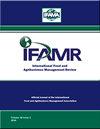Broiler production systems in Ghana: economics and the impact of frozen chicken imports
IF 1.5
4区 经济学
Q3 AGRICULTURAL ECONOMICS & POLICY
International Food and Agribusiness Management Review
Pub Date : 2022-04-19
DOI:10.22434/ifamr2021.0142
引用次数: 6
Abstract
Chicken meat consumption in Ghana has significantly increased in the last two decades. However, production has stagnated, and domestic producers are struggling to satisfy the local market. Consequently, Ghana is dependent on chicken imports. The imports have attracted criticism as they are believed to be negatively affecting producers. This paper uses typical farms to analyze broiler production systems in Ghana and the impact of chicken imports. The typical farms represent the most common broiler production systems in the most important producing regions (Accra, Kumasi, and Dormaa). Large-scale integrated, medium-scale, and small-scale production systems were identified as the most common broiler production systems. The study demonstrates that feed and day-old chick costs are the most significant production cost items. The study also shows that broiler production is profitable for all systems when only considering cash-costs. Medium-scale farms located in Dormaa are unprofitable in the medium and long-term, when depreciation and opportunity costs are reflected, respectively. Cost comparisons show that imports make it difficult for broiler producers to market their chickens in the local market throughout the whole year. Therefore, broiler production in Ghana is seasonal. Furthermore, small-scale producers are the most negatively affected by the competition from the imports.加纳肉鸡生产系统:经济学和冷冻鸡肉进口的影响
在过去的二十年里,加纳的鸡肉消费量显著增加。然而,生产停滞不前,国内生产商正在努力满足当地市场。因此,加纳依赖鸡肉进口。这些进口受到了批评,因为它们被认为对生产商产生了负面影响。本文使用典型的农场来分析加纳的肉鸡生产系统和鸡肉进口的影响。典型养殖场代表了最重要产区(阿克拉、库马西和多马)最常见的肉鸡生产系统。大型综合、中等规模和小规模生产系统被确定为最常见的肉鸡生产系统。研究表明,饲料成本和日龄鸡成本是最重要的生产成本项目。该研究还表明,如果只考虑现金成本,肉鸡生产对所有系统都是有利可图的。如果计入折旧成本和机会成本,Dormaa的中型农场在中长期内是无利可图的。成本比较表明,进口使肉鸡生产商难以全年在当地市场销售他们的鸡。因此,加纳的肉鸡生产是季节性的。此外,小规模生产者受到进口产品竞争的最不利影响。
本文章由计算机程序翻译,如有差异,请以英文原文为准。
求助全文
约1分钟内获得全文
求助全文
来源期刊

International Food and Agribusiness Management Review
AGRICULTURAL ECONOMICS & POLICY-
CiteScore
2.90
自引率
0.00%
发文量
0
审稿时长
>12 weeks
期刊介绍:
The IFAMR is an internationally recognized catalyst for discussion and inquiry on issues related to the global food and agribusiness system. The journal provides an intellectual meeting place for industry executives, managers, scholars and practitioners interested in the effective management of agribusiness firms and organizations.
IFAMR publishes high quality, peer reviewed, scholarly articles on topics related to the practice of management in the food and agribusiness industry. The Journal provides managers, researchers and teachers a forum where they can publish and acquire research results, new ideas, applications of new knowledge, and discussions of issues important to the worldwide food and agribusiness system. The Review is published electronically on this website.
The core values of the Review are as follows: excellent academic contributions; fast, thorough, and detailed peer reviews; building human capital through the development of good writing skills in scholars and students; broad international representation among authors, editors, and reviewers; a showcase for IFAMA’s unique industry-scholar relationship, and a facilitator of international debate, networking, and research in agribusiness.
The Review welcomes scholarly articles on business, public policy, law and education pertaining to the global food system. Articles may be applied or theoretical, but must relevant to managers or management scholars studies, industry interviews, and book reviews are also welcome.
 求助内容:
求助内容: 应助结果提醒方式:
应助结果提醒方式:


